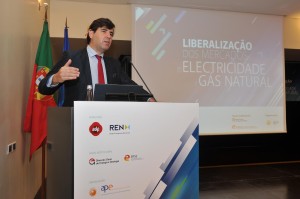Portugal and Spain have been operating MIBEL, the Iberian electricity market, and are building a gas market, MIBGAS. Both countries have been deregulating their gas and electricity markets following the broader European trend set by EU market directives. The Portuguese government recently accelerated the pace towards privatization. It sold its shares in national energy companies earlier this year, as a measure towards restructuring its economy and meeting its fiscal commitments with the EU and international institutions under the terms of its financial assistance package.
At the seminar, Liberalization of the Electricity and Natural Gas Markets, key decisionmakers from Portugal and Spain spoke about the way forward and the obstacles to efficient markets and competitive energy pricing.
Artur Trindade, Portugal’s Secretary of State for Energy, stated the government’s commitment to guaranteeing a competitive energy offer. But he emphasised the need to reinforce electricity and gas interconnections with the rest of Europe: “We cannot benefit from the European energy market or from grid integration until there is sufficient interconnection between the Iberian Peninsula and France,” he said in an opening speech.
Bartlomiej Gurba, from the European Commission’s energy branch, reviewed the implementation of the “third energy package”, an EU legislation aimed to further liberalize markets. He showed how market integration favours competitive pricing, and discussed development of legally binding network codes and guidelines, which are essential for smooth and efficient market operation.
Portuguese and Spanish energy regulators spoke about market integrity and transparency, emphasising the importance of reporting and monitoring, as well as the need to harmonize both countries’ capacity allocation procedures, access tariffs, and market balancing mechanisms for the wholesale markets. OMIP, the Portuguese operator of MIBEL, said there remained challenges related to energy subsidies, interconnection management, and the integration of renewables into a competitive market.
Other speakers discussed the liberalization of the retail market. Pedro González from UNESA, a member of WEC Spain, pointed out some drawbacks in Spain’s domestic retail market, such as regulated consumer electricity tariffs and price caps.
Jorge Cruz Morais, Chair of Associação Portuguesa de Energia (APE), the WEC’s Portuguese Committee, said the seminar showed that market liberalization receives “full support” from Portuguese energy suppliers. However, more harmonization of policies and regulations between Portugal and Spain is still needed to improve efficiency, competitiveness, and transparency of the Iberian electricity and gas markets, he said. The even greater challenge is integration with wider Europe. Mr Cruz Morais said: “Due to the lack of significant electricity and gas interconnections with France, Iberian energy operators cannot participate in the European energy market and contribute to European gas supply security.”






